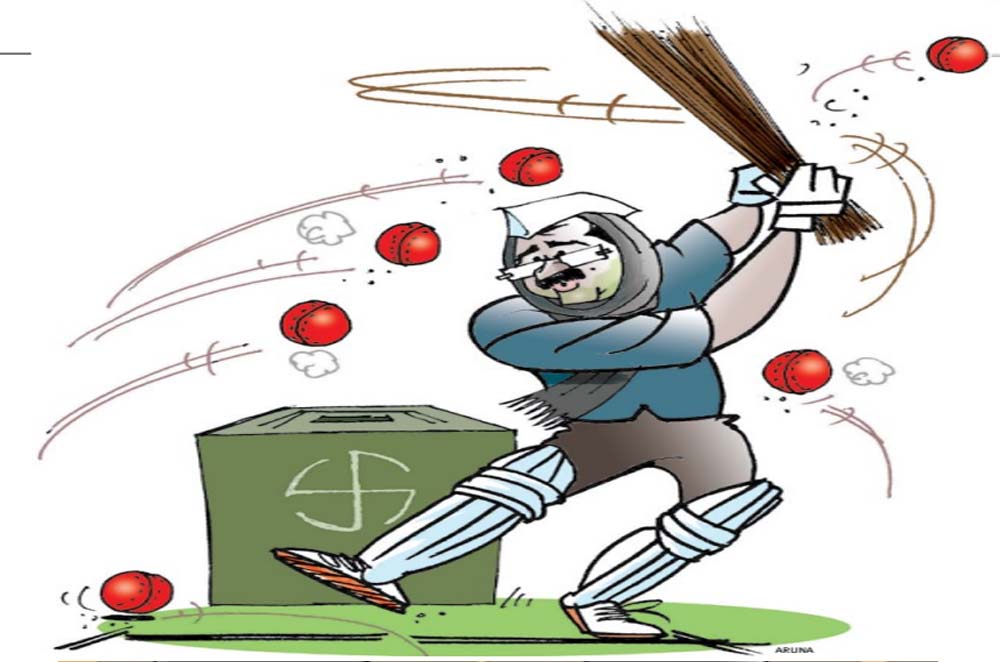IN a piece entitled ‘The Rise and Fall of Team Anna’ in gfiles, soon after the Lok Pal Bill was not passed by the RajyaSabha about two years back, I had asked a rhetorical question: Will there be a second coming for Team Anna? I noted that the Christians had been waiting in vain for the second coming of Jesus Christ for the last 2,000 years. The Buddhists similarly believed that Gautama the Buddha will come again as Lord Maitreya. The Theosophists, led by Annie Besant, even projected Jiddu Krishnamurti as Lord Maitreya, but the anointed apostle threw off the yoke, disbanded the Order of the Star and declared that he was not the Messiah.
Would there be a second coming for Team Anna, I asked. My answer was: “I doubt it. They had their chance and they missed it.” I was wrong. Kejriwal has bounced back.
Today, Kejriwal is a phenomenon. He has suddenly burst on the national scene like an unlikely comet, leaving old stalwarts open-mouthed in dismay. He pontificates on political issues with the confidence of an old campaigner, and enunciates the elements of a new utopia with messianic fervour.
Having heard him define the New Polity in driblets, I wanted to see whether there was a document which contained the detailed contours of his proposal. I discovered a slim 151 page book called Swaraj, published by Harper Collins in August 2012. It is priced at a modest `150, as Kejriwal has forgone his royalty.
It is curious that Kejriwal should have called his manifesto ‘Swaraj’, just like Mahatma Gandhi. I have often felt that Gandhi is the unstated inspiration for Kejriwal, with a broad similarity of perceptions with regard to the primacy of the village, non-violent non-cooperation, peaceful agitation, fast unto death, involvement of millions of common people, taking up issues with high emotive appeal, hating the sin and not the sinner, simplicity in personal life and so on. Like Gandhi, he has a soft exterior, but inside he is as tenacious as steel. The list is virtually endless.
The book has a Foreword by Anna Hazare, who calls it the manifesto of the India of tomorrow. Those were happier days before the two stalwarts of the India against Corruption movement drifted apart. The reasons for the split have now come out into the open. Kejriwal wanted to launch a new political party. Anna felt that politics was like mud; they would be sullied by the contact. Kejriwal argued that if politics was mud, they would need to get into the mire and clean it up. This conflict of perception is reminiscent of the differences that cropped up between Gandhi and Nehru on many issues, like the acceptance of Partition, appeasement of Mohammad Ali Jinnah and the disbandment of the Congress Party after the achievement of freedom, to give only a few examples.
In the Preface, Kejriwal says that we fought for Independence from the British because we wanted swaraj, or self-rule. But this did not happen. The British went away, but their system remained in place. We do not want leaders and officers sitting in Delhi to formulate development schemes for the people.
Self-rule means that the government should function according to the wishes of the people. Laws, rules and regulations should be formulated with the consent and participation of the people. The people should decide all momentous issues in a scientific and systematic manner, so that our resources like land, water, coal, iron ore, etc., are not taken away by foreign governments and investors, domestic business houses, corrupt politicians and bureaucrats for a pittance.
In the present system of governance, the people have only one right: the right to vote for their representatives in Parliament, vidhan sabha, and self-governing institutions like Panchayati Raj bodies and municipal committees and corporations. This power is exercised only once in five years. The politicians woo the voters for a little while during the electoral process and promptly forget them for the next five years.
The people have no control over government employees, who are supposed to serve them. Even if the teacher does not attend the school, the doctor does not give medicines or the constable does not record their FIR, they have no remedy except to complain to their superiors with little effect. The gram sabha cannot summon these employees for an explanation, stop their salaries or punish them.
THE people have no control over government funds. Whenever the people demand something, they are told that there are no funds. On the other hand, there are plenty of funds for schemes, like old age pensions, widow pensions, NREGA, ration, etc., formulated on all -India basis by planners sitting in Delhi and State capitals.
The people are not consulted while formulating laws, rules and schemes. Nobody asks them when their land is acquired for the benefit of foreign and indigenous companies. Natural resources are allotted to large business houses, charging them a tiny fraction of what they earn from their disposal. Forests, which used to serve the needs of tribals living in or near them and were not interfered with even by the mighty British, were taken over by the forest departments after Independence and massive deforestation took place. In many cities, water is being distributed by companies. Whole rivers are being gobbled up in the wake of dam construction.
Kejriwal poses the question as to why India is up for sale and why the people are unable to do anything to stave off the challenge.
His answer: There is no democracy in India. The people have understood the game. They do not find the politics of voting once in five years as acceptable. “We, the people” want a direct participation in power. In Kejriwal’s utopia, the people shall take decisions, and politicians and officials will have to implement them.
It might be argued that a decentralised democracy exists in India, but the Panchayati Raj system suffers from several infirmities. The panchayats have very limited powers and whatever limited powers they have, vest in the sarpanch and not in the gram sabha. The people have no power to take action against a corrupt sarpanch. All the powers vest in the district collector and the State government. What is required is a shift of powers from the State governments, district collectors and sarpanches to the gram sabhas.
KEJRIWAL has cited the examples from other countries to demonstrate that he is not suggesting something unique or eccentric. In the US, a small municipality in the State of Oregon disallowed a proposal of Walmart to open a store in their town. Their decision was final. In Brazil, a budget for slum areas was prepared on the streets in consultation with the beneficiaries and even the World Bank had to concede that there was, consequently, tremendous development. In Switzerland, if 50,000 persons sign a petition and ask for a law, it has to be presented as an act in the parliament. Thus, there is direct participation in governance in many countries of the world.
So what actually needs to be done? Kejriwal says that the gram sabhas, which consist of all the residents of a village, should be vested with all powers. They should appoint the local officials and have the power to summon anyone to the meeting of the sabha. They should have the power to punish and to stop the salary.
Kejriwal says the gram sabhas, consisting of all the residents of a village, should be vested with all powers. They should have the power to punish
No schematic funds should be spent in a village. It would be better to allot an untied fund to the sabha, which they can spend as they wish. They could give a house to a homeless family, or support some indigent with foodgrain, or grant a loan to a person for starting a business, or set up factories, or grain banks. Thus they could ensure that no one in the village died of hunger, or was forced to take a loan from a moneylender at an exorbitant rate of interest, or committed suicide due to frustration.
Towards the end, Kejriwal anticipates the various misgivings people have about the proposed reforms package. He pooh-poohs the suggestion that vesting of powers in the gram sabhas will inexorably lead to corruption, favouritism, groupism, repression of Dalits, strengthening of outdated institutions like khap panchayats, perpetuation of traditional social evils and so on.
He goes on to suggest that there should be mohalla sabhas in towns too, and all the suggestions made for empowering gram sabhas should be applied to urban areas too.
Swaraj: A Critical Appraisal
There is no doubt in my mind that Kejriwal has hit upon a fundamental truth about the system of governance in this country. It is that we have over-centralised the entire structure of economic planning. On the one hand, we wish to remove controls and empower the private sector, but on the other hand, we have not dismantled the planning apparatus, a reminder of the balmy days of the socialistic pattern of society and the Mahalnobis model and development of the commanding heights of the economy.
Many of us have balked at the distinction made in the various budgets between plan and non-plan expenditure, a distinction that has harmed the system of governance more than any other factor. In our topsy-turvey system, we get unlimited amounts of money to build new assets, schemes and projects, but we are starved to death with respect to maintenance of assets and infrastructure already in existence.
The media has been playing its usual games. After the AAP’s surprise win in December 2013, they raised Kejriwal to the skies and catapulted him to the pedestal of a possible winner of the plum position of the Prime Minister. The latest opinion polls have predicted just 7 to 12 seats to AAP in the elections to the Lok Sabha. Political parties and their supporters in big business and the media are attacking Kejriwal and his chief lieutenants like sharks on non-issues like a poem written six years ago, a dharna against police inaction and a foiled attempt to persuade the police to raid a suspect premises.
They fail to recognise a paradigm shift in the political dialogue of this country. It is immaterial whether Kejriwal and the AAP survive. Politics in India will never be the same again. Kejriwal has had his Second Coming. Whether he is the messiah we have all been waiting for, only time will tell!
MK Kaw is a former Secretary, Government of India
















































